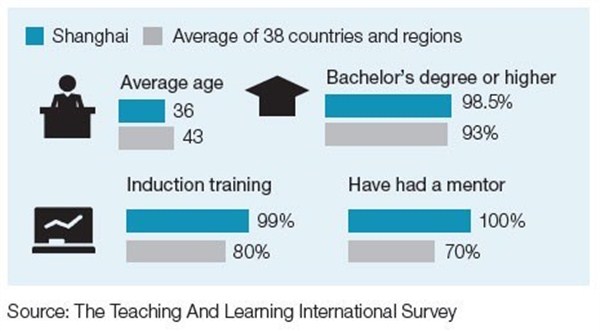
Shanghai Today
City teachers get top marks in global survey - February 26, 2016
“教师教学国际调查”结果揭晓,上海教师水平远超国际均值

SHANGHAI middle school teachers are better educated and trained than their counterparts in other countries, according to a survey undertaken by the Organization for Economic Co-operation and Development (OECD).
The Teaching And Learning International Survey (TALIS) was launched by the OECD in 2008 in 24 countries and regions to assess teachers' professional development, teaching practices and working environment.
A second survey was conducted between 2013 and 2015 in 38 countries and regions, and Shanghai participated for the first time in January 2015.
"Shanghai teachers drew considerable attention from all over the world after 15-year-old students in Shanghai won first place in the Program for International Student Assessment (PISA) tests," said Zhang Minxuan, director of the TALIS program in Shanghai.
"People from other countries want to know how our teachers can have those achievements and the survey may shed some light on it."
Among 3,925 polled teachers from 199 randomly selected middle schools in Shanghai, 98.5 percent have bachelor's degrees or higher degrees, putting them first in the survey conducted between 2013 and 2015. The average in the 38 countries is 92.7 percent.
About 98 percent have learned educational methodology and 96 percent have mastered the disciplines they are teaching, while the international averages are less than 94 and 90 percent respectively.
More than 99 percent of Shanghai teachers said they had received induction training when entering local middle schools as new teachers, much higher than the international average of 80 percent.
All of them said they had been guided by a mentor who taught the same courses, while only 70 percent of teachers polled in all areas had received guidance from experienced people.
Teachers in Shanghai are also engaged more in professional discussions and observe the work of other teachers more frequently than their foreign counterparts.
Chinese education is sometimes dismissed by people in other countries as rote-learning, so OECD officials may have been surprised by the fact that 75 percent of Shanghai teachers wanted training in personalized teaching methods and nearly 71 percent of them had taken part in related activities in the previous year.
The Teaching And Learning International Survey (TALIS) was launched by the OECD in 2008 in 24 countries and regions to assess teachers' professional development, teaching practices and working environment.
A second survey was conducted between 2013 and 2015 in 38 countries and regions, and Shanghai participated for the first time in January 2015.
"Shanghai teachers drew considerable attention from all over the world after 15-year-old students in Shanghai won first place in the Program for International Student Assessment (PISA) tests," said Zhang Minxuan, director of the TALIS program in Shanghai.
"People from other countries want to know how our teachers can have those achievements and the survey may shed some light on it."
Among 3,925 polled teachers from 199 randomly selected middle schools in Shanghai, 98.5 percent have bachelor's degrees or higher degrees, putting them first in the survey conducted between 2013 and 2015. The average in the 38 countries is 92.7 percent.
About 98 percent have learned educational methodology and 96 percent have mastered the disciplines they are teaching, while the international averages are less than 94 and 90 percent respectively.
More than 99 percent of Shanghai teachers said they had received induction training when entering local middle schools as new teachers, much higher than the international average of 80 percent.
All of them said they had been guided by a mentor who taught the same courses, while only 70 percent of teachers polled in all areas had received guidance from experienced people.
Teachers in Shanghai are also engaged more in professional discussions and observe the work of other teachers more frequently than their foreign counterparts.
Chinese education is sometimes dismissed by people in other countries as rote-learning, so OECD officials may have been surprised by the fact that 75 percent of Shanghai teachers wanted training in personalized teaching methods and nearly 71 percent of them had taken part in related activities in the previous year.


